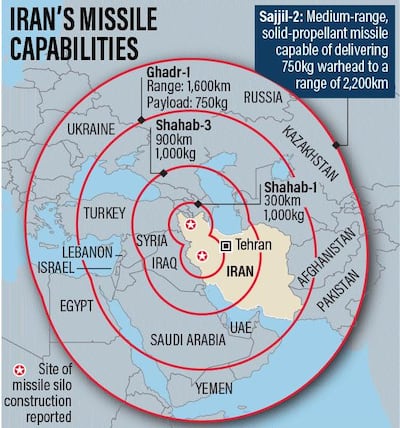Iran has confirmed it has carried out a recent ballistic missile test, in what appears to be a breach of a UN resolution and Tehran's nuclear deal with world powers.
Iran was accused of launching a medium-range missile earlier this month by US Secretary of State Mike Pompeo, but it was denied by Tehran.
"We are continuing our missile tests and this recent one was a significant test," the Fars news agency reported, citing Revolutionary Guard aerospace commander Brig Gen Amir Ali Hajizadeh, but they did not specify the type of missile tested.
"The reaction of the Americans shows that this test was very important for them and that's why they were shouting," Mr Hajizadeh said. The country carries out up to 50 missile tests a year, he added.
The British ambassador to the UN Karen Pierce said last week that the test on December 1 was inconsistent with UN Resolution 2231, and went “way beyond legitimate defensive needs”.
Resolution 2231 enshrines the Joint Comprehensive Plan of Action (JCPOA) and requires Iran “not to undertake any activity related to ballistic missiles designed to be capable of delivering nuclear weapons, including launches using such ballistic missile technology” until 2024 at the earliest.
The JCPOA bans Iran from developing missiles capable of carrying nuclear warheads, and "calls upon" the country to refrain from developing missiles. Some argue that this language does not make it obligatory not to develop missiles.
Iran claims their missiles are for defensive purposes only and are not capable of being tipped with warheads.
A report released by weapons researchers at the Middlebury Institute of International Studies in California earlier this year suggested that Iran had been carrying out missile tests at a previously unknown facility near Shahrud in the country's north-east. The report said analysis of satellite images of the area suggested Iran may be developing technology for missiles with a range beyond 2,000 km.
This year, US President Donald Trump pulled out of the JCPOA – more commonly known as the nuclear deal, which lifted sanctions on the regime in exchange for curtailing their nuclear programme – saying Iran was in breach.
The US has since reimposed sanctions on Iran, targeting buyers of the country's oil. Sanctions also targeted Iran's banking, aviation and maritime sectors.
Iran's December 1 test is a deliberate provocation to the US, Jordan Steckler, a research analayst at United Against Nuclear Iran told The National.
"At a time when the EU has continuously struggled to create a mechanism for continued European trade and investment with Iran, the ballistic missile tests, as well as Iran's stepped up campaign of assassinations and terrorist plots on European soil, show that Tehran has no intentions of moderating its behaviour," he said.
European countries are still signed up to the deal, but they have been under pressure to toughen their stance against Iran, and the admission of another test will make it hard to continue to defend their ties with the country.
European leaders condemned the reports of the missile test last week before Iran had admitted to it.
British Foreign Secretary Jeremy Hunt called the test “provocative, threatening and inconsistent” with the UN resolution, a sentiment echoed by Francois Delattre, the French ambassador to the UN.
_______________
Read more:
Britain accuses Iran of flouting UN resolution with new missile test
US warns of regional conflict as it displays Iranian arms intercepted across Middle East
Iran launches domestically made destroyer, state media says
Opinion: A stash of ammunition shows the grave risk Tehran poses to regional security
_______________
In November, Mr Hajizadeh warned their missiles could strike US military targets in the UAE, Qatar and Afghanistan. He said his unit had increased the precision of Iranian missiles.
Iran has launched missiles across its borders at least twice in recent years, striking targets in eastern Syria in 2016 and in October this year after terrorist attacks claimed by ISIS.
Iranian-made weaponry has been found across the Middle East, being used by proxies in Yemen, Bahrain, Iraq, Lebanon and Syria.
Last month, the US administration warned of regional conflict fuelled by the spread of Iranian weaponry.


